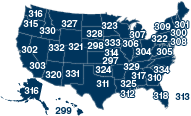In the final weeks of 2015, the 114th Congress exhibited a rarely seen example of bipartisanship when passing an omnibus spending bill, H.R. 2029. This $1.1 trillion spending package encompassed many of the smaller regular appropriations bills into one larger single bill, and will keep the federal government funded through the 2016 fiscal year, which ends on September 30, 2016. The House passed the bill 316-113, with 150 Republicans supporting the measure and 95 opposed. Among Democrats in the House, 166 voted for the legislation and 18 voted in opposition. In the Senate, Democrats overwhelmingly endorsed the compromise, while Republicans were evenly split on the bill.
The omnibus spending bill includes funding for all federal agencies including:
- $141.3 billion for Agriculture
- $66 billion for Commerce-Justice-Science
- $572.7 billion for Defense
- $37.2 billion for Energy-Water
- $44.6 billion for Financial Services
- $41 billion for Homeland Security
- $32.2 billion for Interior-Environment
- $884.1 billion for Labor-HHS-Education
- $4.4 billion for Legislative
- $173.3 billion Military Construction-Veterans Affairs
- $52.8 billion for State-Foreign Operations
- $114 billion for Transportation-HUD
With respect to the Postal Service, the bill delivers mixed results. The spending package does require that the USPS continue 6-day delivery of mail. In addition, the bill demands that none of the funds provided in this Act shall be used to consolidate or close small rural and other small post offices. The omnibus spending measure also allocated $55 million to continue overseas voting and mail for the blind, and did not include any adverse amendments that could impact postal retirement or health benefits. Sadly, the bill did not specifically address the threatened closures and consolidations of 82 additional mail processing facilities identified in the second phase of the USPS network rationalization initiative; nor does the bill speak to the mail delivery delays caused by previous facility closures.
When commenting on the spending bill, NPMHU President Paul Hogrogian said, “It is rare that any piece of legislation fixes everything and that certainly is the case with H.R. 2029. The preservation of 6-day delivery is a win for the American public, and our rural customers should be equally pleased with the Act’s prohibition on using any funding to consolidate or close small rural and other small post offices.” However, the Act did nothing to address the deterioration of service and diminished service standards caused by the recent closure or consolidation of 141 facilities in phase one of the network rationalization initiative; also the Act does not address the negative impact of the threatened closure or consolidation of 82 additional mail processing facilities recently delayed until at least April 2016. “The NPMHU is pleased that the Act contained many labor friendly provisions, but our work is not done. The NPMHU will continue to challenge the Postal Service facility closures slated for 2016,” said Hogrogian. Any further closures will destroy the delivery and processing network and depreciate service to a point of no return. This is not acceptable to the NPMHU, other postal unions, or many major mailers, and should not be acceptable to the American public or its elected representatives in Congress.
The NPMHU also is pleased that Congress chose to include another important provision in the bill, to postpone implementation of the Affordable Care Act’s so-called “Cadillac Tax.” Congress has shown bipartisan courage in voting to postpone implementation of this tax on high-cost health insurance for at least two years. The NPMHU joins with LIUNA and many other labor organizations, employers, health policy advisors, and other groups opposed to this indefensible, misguided, and regressive 40-percent middle-class excise tax on collectively bargained benefits. Congressional action, while not the hoped-for outright repeal of the Cadillac Tax, is a big step in the right direction, and signals a recognition that the tax is deeply flawed. In the additional two years provided by this delay, the NPMHU hopes that Congress and the next President will, once and for all, repeal this unjustified tax and protect the bargained benefits for which the NPMHU, LIUNA, and other labor organizations have long fought.
At last, the 114th Congress has displayed a good example of true bipartisanship: the leaders of our country coming together, resolving their differences, and getting the important work of governing done. The NPMHU hopes that this spirit of patriotic teamwork continues into the New Year, as Congress grapples with a wide range of other important issues, including postal reform.
